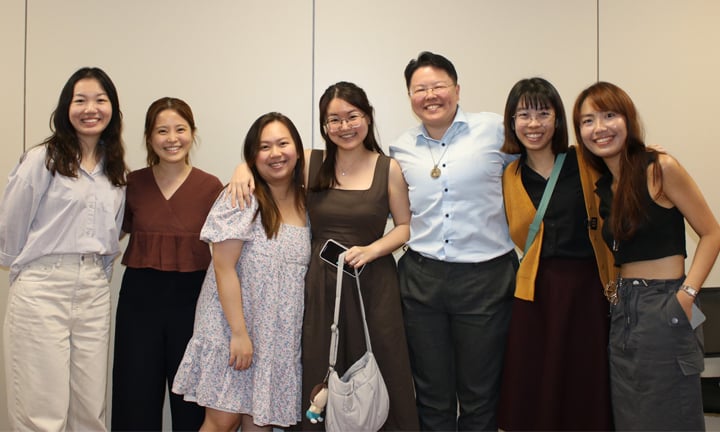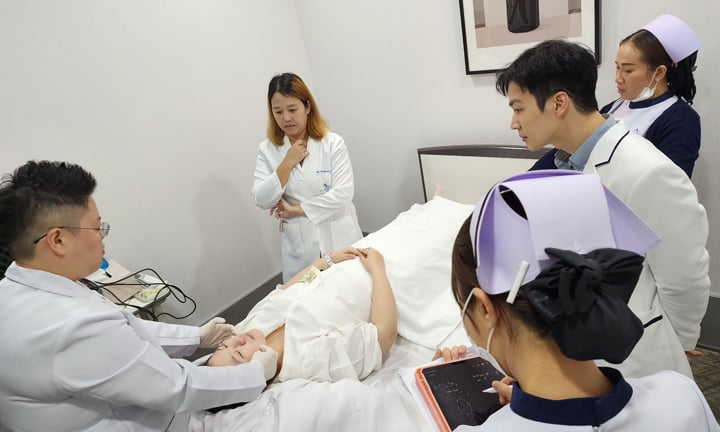The TCM physician who modernises ancient remedies with technology
In a bid to modernise the traditional Chinese medicine (TCM) trade, alumna Leong Weizhen integrates ancient remedies with technology-driven treatments. She also leads her alumni association in advocating for better public awareness of TCM’s benefits.
By Nur Isyana Isaman
As a teenager, Leong Weizhen (SBS/2010) witnessed her grandparents struggle with chronic conditions, including cancer and stroke. She wanted to alleviate their discomfort and began exploring holistic approaches to healthcare.
 | |
Leong Weizhen was motivated by her family to pursue TCM. |
With a desire to care for her family members and a mother who always dreamt of having a doctor in the household, she enrolled in the Chinese Medicine undergraduate course at NTU Singapore’s School of Biological Sciences in 2005. The bright-eyed student continued to pursue a Master of Science at Beijing University of Chinese Medicine in China under a scholarship and underwent three years of clinical training.
“My education at NTU opened my eyes to the benefits of traditional Chinese medicine, which emphasises prevention and balance in the body, and also made me understand how the integration of Western and Chinese medicine can make tangible differences to patients,” said Weizhen.
With the vision to implement comprehensive patient care based on TCM, Weizhen established her first private clinic at Jurong East in November 2013, right after returning to Singapore following her postgraduate studies.
Early in her career, the 38-year-old faced doubts from her patients, who felt she was too young to be a physician. It was also difficult to get new patients as her clinic lacked a unique selling point to stand out from other healthcare providers. In 2016, she met a business partner who revitalised the company.
Today, Oriental Remedies Group has five branch clinics in Singapore with 60 employees. Weizhen leads nine therapists and 15 physicians as the Group’s Chief Medical Officer. 80% of the physicians hired are her juniors from NTU.
Weizhen gives back to her alma mater by serving as President of the NTU Chinese Medicine Alumni Association. She plans to roll out a mentorship programme for fellow alumni, where experienced practitioners guide younger graduates, fostering knowledge transfer and enabling professional development.
“We advocate for better public awareness of TCM and its benefits. People need to know that TCM, with its emphasis on promoting balance, prevention and overall wellbeing, can play a significant role in supporting their health,” she said.
 Leong Weizhen (third from right) with the current 7th executive committee members of the NTU Chinese Medicine Alumni Association.
Leong Weizhen (third from right) with the current 7th executive committee members of the NTU Chinese Medicine Alumni Association.
Weizhen was particularly inspired by two NTU professors, Dr Zhao Yan and Prof James Tam, who conduct research on TCM, sparking her curiosity in innovating Chinese medicine therapy.
Assoc Prof Linda Zhong, Director of Biomedical Sciences and Chinese Medicine at NTU’s School of Biological Sciences said: "The integration of technology in TCM practice is complementary in nature. This combination can help diagnose patients more accurately and enhances the treatment process. All our students have some basic knowledge of these modern techniques."
Weizhen furthered her training in the US. She has introduced an electro-lymphatic therapy device in her therapy -- the device uses vibrational, light and electrical waves to stimulate proper flow and drainage of lymph fluids to provide relief for patients. She has also launched two other technology-enhanced therapies aimed at improving patients’ general wellbeing in her clinics.
 Leong Weizhen (first from left) hires most of the clinics' physicians from NTU. She conducts in-house training for her team.
Leong Weizhen (first from left) hires most of the clinics' physicians from NTU. She conducts in-house training for her team.
The future of TCM
Looking ahead, Weizhen finds that one way for TCM to advance is through technological integration, and the other is for the practice to be recognised.
She said: "TCM is becoming more recognised as a key treatment method but more needs to be done to increase public awareness of its benefits and how it can significantly support people’s health by preventing illnesses and boosting wellbeing. It helps to broaden the range of treatments and therapies with new specialisations and innovations. My team and I are investing in research and development to improve our practice and to contribute to the broader acceptance and integration of Chinese medicine in global healthcare."
Recently, NTU Singapore has established a new TCM Research and Education Fund to accelerate development in the field of Chinese medicine at the university. The fund aims to develop evidence-based research to validate the efficacy of TCM, especially for chronic diseases.
Assoc Prof Linda Zhong said: "We also look to innovative research areas, such as the integration of artificial intelligence and biomedical engineering in TCM diagnosis."
Noting NTU’s strong emphasis on scientific methodology and evidence-based practices, Weizhen hopes to collaborate with her alma mater on clinical research in the next few years.
She is happy to learn that the university has rolled out a Bachelor of Chinese Medicine programme accredited by the Singapore Ministry of Health's Traditional Chinese Medicine Practitioners Board and will welcome its first cohort this August.
“The new academic programme is a gamechanger for the local healthcare industry. I am excited at the prospect of seeing a new generation of highly skilled TCM practitioners in our industry, which will bolster public confidence in TCM and its ability to complement existing healthcare options,” said Weizhen.
Supporters who are interested to contribute to this Fund may contact NTU’s University Advancement Office at UAO@ntu.edu.sg or donate online now.







